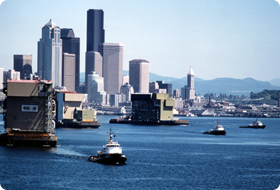Criminalization of Mariners
In light of disturbing international trends, we believe it is imperative that Masters, Pilots & Officers in marine transportation join together to
- uphold standards of professional care and
- Develop a cohesive international strategy against criminalization that resonates with the public, regulatory and judicial agencies worldwide.
We were was recently asked as a pilots could we describe one piloting area or group as having a more or less difficult job than another. No matter the piloting ground, a great deal of experience, training and skill are required of any pilot anywhere. We are the guardians of each region we serve and we must possess the skill to not only safely navigate ships but, just as important, we must know when to advise against moving said ship. We must all walk the fine line between keeping commerce moving while still safeguarding the environment. Most assuredly, we believe in standards of professional conduct that are greater than self interest and embrace the Public Trust. The certainty of future demand for commerce in the face of ever increasing liabilities and the real possibility of prison (for mistakes) makes holding to the above mentioned standards no easy task. Yet that is the very task set not only for pilots but for all who share responsibility for the safe movement and management of ships at sea.
The fact is, as we all know, marine transportation is absolutely vital to the world economy: Ninety percent of the world’s trade is moved via water, estimates of the overall safety record for the industry are in the range of 98%. Ever day thousands of ships sail the world, operated and managed by professionals who go about there work with little fanfare overcoming dangers and providing the world with a vital, irreplaceable service.
So how is it that, following maritime accidents, we find government after government ignoring international maritime treaties and admiralty law? Relying instead on government attorneys, in government courts, whose primary objective seems to be initiating a prison sentence rather than following legal precedent and laws related to maritime conduct. How did marine transportation become so disconnected from the general public it so vitally serves? Part of the answer may lie in the vast technological changes occurring in the 21 century that have transformed all things, including the media. Traditional paper media required time and verification of established facts. For the most part, the general public came to trust what it read. In our “instant information age” of the internet, however, the time required investigate, verify and report has become almost outmoded. The internet’s public domain assures that anyone can say almost anything regardless of facts or their expertise. Unfortunately the public at large still trusts what it reads and hears, so can become ignorant of the facts. Thus in a negative media vacuum following a maritime accident, marine transportation suffers a poor public opinion. This, of course, is reinforced with every one of the 2% of movements that do have incidents.
So what is to be done? First and foremost we must come together as professionals acting in unison. We are our own best advocates, who else has the concern, desire or knowledge to effect the kind of change in international mindset that is now required for the long term health of the world’s marine transportation system? It is incumbent upon us to act in stemming the tide of criminalization while still upholding professional standards of care. Small steps move mountains, people effect change and although it will take time, the time as come to develop a cohesive international strategy countering criminalization that resonates with the public, regulatory and legal systems worldwide.
What better year to start than 2010, “The Year of The Seafarer”. Let us work with IMF’s Secretary-General Mr. Efthimios Mitropoulos “to reassure those working at the ‘sharp end’ of the industry that those responsible for the international regulatory regimes and those who serve shipping from ashore understand the extreme pressures that seafarers face, and, as a result, approach their own work with a genuine sympathy for the work that seafarers carry out;’ and to convey to those 1.5 million seafarers that there is understanding “as shown by the efforts to ensure that seafarers are fairly treated when ships become involved in accidents;..”
As published in Seaways Magazine, July 2010, a publication of The Nautical Institute.
